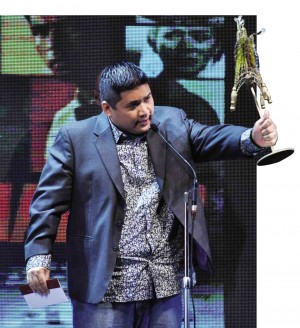Mainstream man hopeful for indie future

On the afternoon of a sudden downpour that flooded city streets, filmmaker Michael “Mike” Tuviera sat down with the Inquirer Entertainment staff for this interview, which he would later compare, on Facebook, to a “Senate hearing.”
Indeed, he had initially looked jittery, but in the end he swore he had a good time, recounting “war stories” behind “The Janitor,” an action thriller about a conflicted assassin and a bloody bank heist that won five trophies, including Best Director, at this year’s Cinemalaya Independent Film Festival.
“The Janitor” is the very definition of a “maindie,” a movie that straddles the indie and mainstream terrains with the least discernible effort.
The way he experienced it, however, “Making an indie film is hard enough, making an indie action film is 10 times more stressful.”
And nothing could have prepared him for the controversy that erupted after Star Cinema, ABS-CBN’s film company, picked up “The Janitor” for distribution. (The film opens in cinemas nationwide on Oct. 8).
In the posters prepared by Star Cinema, the name of cast member Derek Ramsay was conspicuously missing. In a press conference organized by the studio, reporters spoke in whispers about Ramsay as “He Who Must Not Be Named.”
Ramsay was an ABS-CBN talent before he moved to TV5. The transfer reportedly led to the “ban” by his former network.
To his credit, Tuviera—whose father, Antonio P. Tuviera, is the producer of the long-running noontime show “Eat Bulaga”—finessed his way through this hourlong interview with the slick precision of, well, a hitman.
Why was Derek’s name removed from the poster?

DEREK Ramsay (shown here in a scene from “The Janitor”) committed to the project without reading a single page of the script. The movie opens Oct. 8 in theaters. CONTRIBUTEDPHOTO
Star Cinema would be in a better position to discuss the technical details … their relationship with him is different from our relationship with him.
Did you fight for Derek?
It was a situation that was already there when we came in. I made it clear that we would conduct our own campaign and our materials would carry his name. They have their own materials. That’s fair.
Did you anticipate this problem?
I was aware of it but not intimately, because I wasn’t involved. There were things that I couldn’t change.
But Derek wasn’t edited out of the movie?
The movie wasn’t tampered with in any way—I’d like to clarify that. The content is intact. To be fair, Star Cinema never required any change.
Your indie film is going commercial. How does that feel?
We made the film with no limitations in mind, in terms of making it palatable to the general audience. We simply wanted to give justice to the story. It’s very real; there’s a lot of cursing, there’s violence, sex, drug use. There are many elements that wouldn’t have found their way into it, had it been a mainstream film. That’s why I brought it to Cinemalaya. The material couldn’t be pigeonholed as a regular studio release. Now, I am really curious [about how the audience will respond], and excited.
Since you are going commercial, can your team expect a bonus?
That has been discussed. My father, who is the main producer, says it’s the right thing to do. Everyone, cast and crew, had slashed their talent fees, several worked for free or just asked that their pay checks be donated to a children’s charity.
How were you able to shoot within the P3.5 million budget limit imposed by Cinemalaya?
It wasn’t easy.
You had complicated shots and big scenes.
What we saved from talent fees, we put into the film; so you see the whole budget onscreen. We squeezed the value out of every centavo.
We shot for 12 days like the other entries did; the only difference was that our scenes required more complex setups. There are safety requirements for action scenes because people could get hurt if things were not staged properly.
How has indie filmmaking changed you?
I have to salute indie filmmakers. It’s very, very difficult. I grew up and started in the mainstream cinema system. It was the world I was born into. The mainstream scene has its own pitfalls—the politics is much more difficult to navigate.
The Derek debacle is one example of a mainstream pitfall?
Probably. Yeah! But to his credit, Derek didn’t read a single page before committing. He committed blindly, as did Dennis Trillo. And even with Richard Gomez, I never discussed money or billing.
Did they do this for Cinemalaya, for you, or for themselves?
All of the above, I think. I have long-standing relationships with them. Also, they found the story good. [Scriptwriter] Aloy Adlawan hit it out of the park. Of course, they also did it for themselves, for their careers. They knew that if they did well in Cinemalaya, they would get noticed.
Dennis told me that he avoids doing the same thing again and again, so he deliberately changes his rhythm all the time. When “The Janitor” came his way, it was what he was looking for at the time. After his revered performance in [the GMA 7 soap opera] “My Husband’s Lover,” he sought a change of pace. After playing a gay man, he chose to play a hitman.
Did you get comparisons to “On the Job”?
After our [Cinemalaya] screenings, young people would come up to me and ask, “After ‘On the Job’ and ‘The Janitor,’ do you expect a resurgence of action films in the Philippines?” I said I hoped so.
Exactly what is meant by “Janitor” in the title?
Someone who cleans up after others. In the spirit of independent cinema, I didn’t want an easy title. In older action films, titles often consisted of phrases, for instance, “Babalikan Kita…” A simple one like “The Janitor” sparked a lot of dialogue.
Your titular character is quite messy for a clean-up man. Was that intentional?
Yeah, for me. I see the movie as the downward spiral of a good man. He was not cut out for that job. He is too black-and-white. Unfortunately, the world is not like that.

TUVIERA works in the commercial scene, but checks out the indie world, “for a breath of the alternative.”
Research for the movie entailed interviews with real hit men. How scary was that?
I was scared out of my mind. I arrived at the appointed place ahead of Dennis. At first, I didn’t want to take Dennis with me. In the end, I refused to enter without Dennis.
Were they fans of his?
I don’t think they watch a lot of television. They knew him and admired his work. But they weren’t star-struck.
Looking back, what was the eeriest thing about them?
That they could be sitting in this room and you wouldn’t have a clue. They are completely different from what we see in the movies. They explained that, in their line of work, their greatest asset is anonymity. They are not supposed to stand out.
Dennis never told me what he took away from that but, during the shoot, I realized he was like a sponge. I noticed… those little nuances. He had copied their speech patterns, the way they moved their feet, the way they slouched.
What were your biggest obstacles?
The mere fact that it was an indie film magnified and multiplied the usual obstacles. Basically, it was the lack of time and money. But the challenges sometimes became an asset, pushing us to be creative.
For example, a regular studio film would have taken three days to shoot the cornfield chase scene. We did it in two hours, starting at 4 p.m. and finished at 6. It was dusk by then, so we had to shoot the final frame with Alex Medina from above.
Our award-winning cinematographer Marissa Floirendo was going crazy. It might look like nighttime, she said. I assured her it was cool. “Just shoot it straight down,” I said. “We will just play with the colors.”
If you had a bigger budget, where would you have gone with this movie?
The shoot wouldn’t have been that crazy if I had a few more days. Setting up that cornfield scene alone was chaotic. Right after that, we had to set up another scene for the evening shoot.
Did you expect all five Cinemalaya awards?
No. We were very, very surprised. I am a huge Carlos Siguion-Reyna fan. Every time he has a new film, I watch it several times.
But you beat him and won Best Director.
That’s not entirely true. There’s no way to beat him. It was just that the jurors saw different things in our films. What I liked about our batch, in the Directors’ Showcase, was that there’s not much competition. We’ve been through bigger wars, some of them, together.
Competition is also good.
Only in that it pushes you to give your best.
There is a fear in the film community, that there will be no Cinemalaya next year. How do you feel about this?
I really hope not. Someone joked that, on the bright side, if that happened, I would be the last Best Director winner (in the Directors’ Showcase section) in Cinemalaya history. I am not interested in that. (Knocks on wood.) I am interested in seeing a hundred more Best Directors after me.
Cinemalaya is the face of Philippine cinema today. Cinemalaya films are our ambassadors. It would be a step back if Cinemalaya ended here. It would be such a waste.
How can organizers sustain Cinemalaya?
There are some structural problems that need to be addressed. Monetizing the [products] is the biggest concern. Cinemalaya is such a powerful brand now. It connotes quality, international film fest winners. How come you cannot sustain it? If it were a house, unless we fix the foundation, there is no way we can move forward.
Has there been a cry for help?
A meeting, an open forum, has been scheduled with the Cinemalaya Foundation this month. It’s a dialogue on the YouTube controversy (Cinemalaya films uploaded). I am not involved as a director, but APT, our production company, has had three films uploaded: “Bwakaw,” “David F.” and “Ang Katiwala.” The meeting is not to point blame. We should find a solution together.
Should another benefactor from the private sector (like Tonyboy Cojuangco) come in?
That’s a thought. But first, the filmmakers and the foundation should unite. If there is in-fighting, it’s so much harder to seek help from outside.
Actually, can’t the Internet be a source of revenue?
Yes, if things are done right. The filmmakers I’ve talked with are not against the business model. The complaint was about the lack of communication, consultation. The pay-per-view model can work.
APT is neck-deep in the issue, but we cannot let anger or disappointment cloud our better judgment. The question is: Do we collectively dwell on the past, or do we collectively solve the problems so we can have a better future?
The truth is, filmmakers don’t want Cinemalaya to disappear either.
Wasn’t this problem anticipated?
I do not know the actual chain of events. Like most people, I found out only on social media. I’ve talked to filmmakers who got to download and watch their own films online. They told me it was a painful experience.
Would your father help Cinemalaya?
I hope so. But he likes to work in the background; he doesn’t like the spotlight. Many people don’t know that he has produced several independent films.
Are you attending the forthcoming meeting, and what will you bring to the table?
Yes, I will attend. I don’t think I have much to say, but I would like to listen, as one of the producers involved. I’d like to hear about plans and options. Hopefully, it will be a constructive meeting. I am sure it’s going to be emotional, too. But at the end the day, the goal should be the survival of Cinemalaya. In 10 years, it has produced some of the best films in modern Philippine cinema. It would be a tragedy if it ended right now, with a whimper instead of a bang.
Financing shouldn’t be a problem for you, as a director. Do you need Cinemalaya?
I may not need Cinemalaya as a filmmaker, but I want [to be associated with] Cinemalaya because I am a fan. I’ve gone to watch Cinemalaya movies from the very beginning. I loved “Ang Pagdadalaga ni Maximo Oliveros.” I live in the mainstream; I go to Cinemalaya for a breath of the alternative. I also want to see what my peers are doing.
